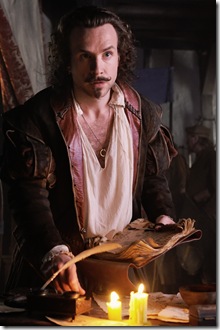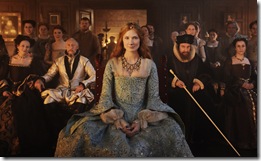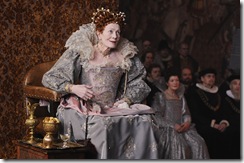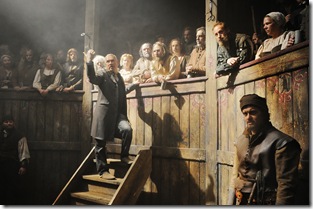Roland Emmerich – he of Independence Day, 10,000 B.C. and 2012 [to name but a few] – takes one of the many theories on who really wrote the works of Shakespeare and turns it into a political thriller that blames all manner of events on… writers?
There are a number of theories as to who really wrote the works of Shakespeare – and dozens of ways to refute them. Anonymous picks one that claims Edward De Vere [Rhys Ifans], the 17th Earl of Oxford was the ‘real’ Shakespeare – and that the real Shakespeare [Rafe Spall] was an actor of limited talent and intelligence but some small cunning.
While playwright Ben Johnson [Sebastian Armesto] dithers over De Vere’s request that he be the aristocrat’s alter ego, the vain Shakespeare steps forward to claim authorship of the first of De Vere’s plays to be produced. Things become twisted and dangerous from that point on.
John Orloff’s script is very Shakespearean in its structure, opening and closing with a narrator [Derek Jacobi] who sets up the story on a modern stage – before we are transported back to Elizabethan England – and appearing at the end to comment on the preceding events.
In between, the story flutters and back and forth between the young De Vere [Jamie Campbell Bower[] impressing Elizabeth [Joely Richardson] with his play, a Midsummer Night’s Dream and the older De Vere frantically writing Richard III to goad the people into ending the influence of a second generation of Cecils – Robert Cecil [Edward Hogg], following in the poisonous footsteps of his father William [David Thewlis] – over a now doddering Elizabeth [Vanessa Redgrave – Richardson’s mother].
Allowing for the way Orloff’s screenplay wreaks havoc on history, it is a sprightly enough tale and surprisingly deftly directed by Emmerich, who is better known for taking a more ponderous approach. Though it really isn’t saying much, Anonymous is easily Emmerich’s best film.
Still, sprightly or not, Anonymous wouldn’t work if we were allowed to blink, or pause to reflect. Thanks to many superb performances and amazing production and costume design, the film captures Elizabethan London beautifully – from the muck and mire of the lower classes’ city, to the varying levels of luxury and comfort afforded the aristocracy.
Between the window dressing and the energetic and involving performances, we are lead to forget that Elizabeth was neither a youthful nymphomaniac nor a doddering, easily led fool; that Ben Johnson was not a poverty-stricken poseur, but one of the great comedic writers of his time, and on and on.
While Anonymous does come up with a reasonable explanation for the fact that Shakespeare’s play and poems continued to be published for more than decade after De Vere’s death, there are so many liberties taken with history – and especially in its claims that it was De Vere’s/Shakespeare’s plays that incited/caused some of English history’s most important moments [the use of some of Shakespeare’s best known lines is, on occasion, pretty forced] – that it winds up being a grand entertainment that is little more than pomped up historical flummery disguised as a political thriller.
Still, it is a grand entertainment and well worth seeing – and, despite Emmerich’s penchant for going big, it’s not in 3D – so you won’t be gouged for seeing it!
Final Grade: B
Photos by Reiner Bajo/courtesy of Sony.



